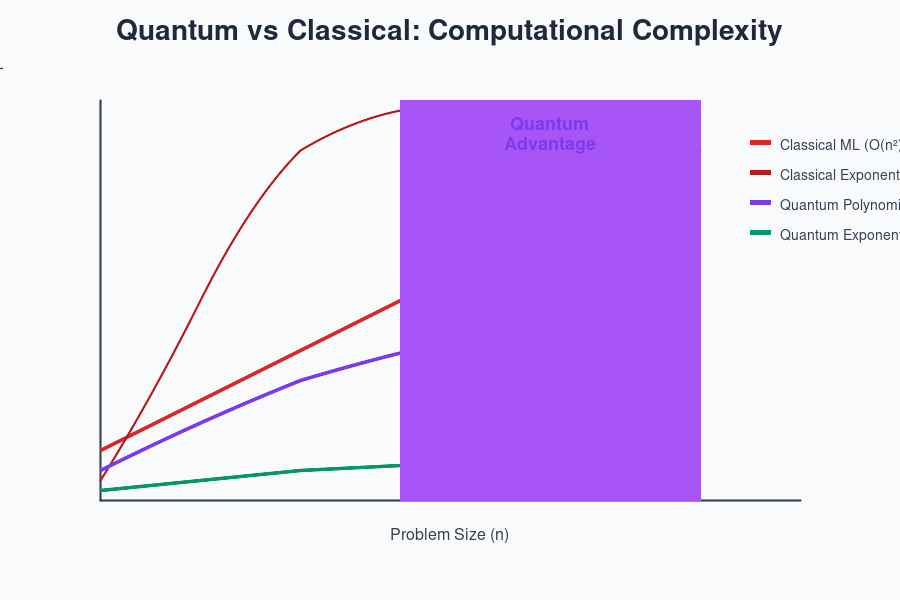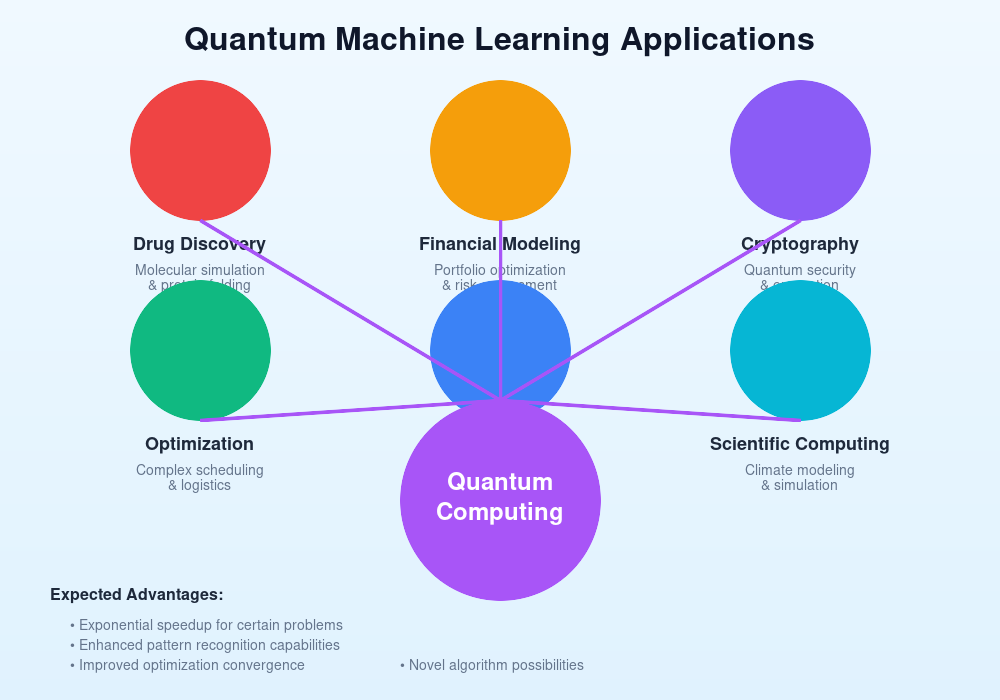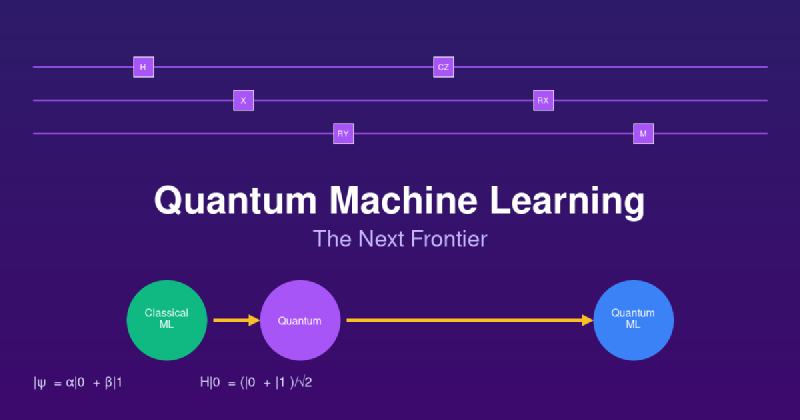The convergence of quantum computing and machine learning represents one of the most profound technological revolutions of our time, promising to unlock computational capabilities that transcend the limitations of classical computing architectures. Quantum machine learning stands at the precipice of transforming how we approach complex problem-solving, data analysis, and artificial intelligence applications across industries ranging from pharmaceutical research to financial modeling and cryptographic security.
Discover the latest developments in AI and quantum computing to stay informed about breakthrough technologies that are reshaping the computational landscape. The intersection of quantum mechanics and machine learning algorithms creates unprecedented opportunities for solving computationally intractable problems that have challenged researchers for decades, opening new frontiers in scientific discovery and technological innovation.
The Quantum Advantage in Machine Learning
The fundamental advantage of quantum machine learning lies in the unique properties of quantum systems that enable exponential speedups over classical computational approaches. Unlike classical bits that exist in definite states of zero or one, quantum bits or qubits can exist in superposition states, allowing quantum computers to process vast amounts of information simultaneously through parallel computation pathways that would be impossible with traditional computing architectures.
Quantum entanglement further amplifies these computational advantages by creating correlated relationships between qubits that enable sophisticated information processing mechanisms. These quantum phenomena allow machine learning algorithms to explore solution spaces more efficiently, potentially reducing training times from years to hours for certain complex optimization problems while simultaneously improving the accuracy and robustness of predictive models across diverse application domains.
The exponential scaling advantages of quantum systems become particularly pronounced when dealing with high-dimensional data spaces common in modern machine learning applications. Classical algorithms often struggle with the curse of dimensionality, but quantum algorithms can leverage the inherent parallelism of quantum superposition to navigate these complex spaces more effectively, enabling breakthrough capabilities in pattern recognition, optimization, and data classification tasks.

The computational complexity comparison reveals the fundamental advantages that quantum systems offer over classical approaches, particularly as problem sizes increase. While classical algorithms face exponential growth in computation time, quantum algorithms can maintain polynomial or even exponential advantages, making previously intractable problems solvable within practical timeframes.
Quantum Neural Networks and Deep Learning Evolution
The evolution of quantum neural networks represents a paradigm shift in how we conceptualize and implement deep learning architectures. Traditional neural networks rely on classical computational units that process information sequentially through layers of interconnected nodes, but quantum neural networks harness quantum mechanical properties to create fundamentally different information processing mechanisms that can capture complex correlations and dependencies in data more efficiently.
Experience advanced AI capabilities with Claude for exploring quantum computing concepts and machine learning implementations that bridge theoretical quantum mechanics with practical application development. Quantum neural networks utilize quantum gates as computational elements, enabling the creation of quantum circuits that can perform complex transformations on quantum states representing input data, potentially achieving exponential improvements in learning capacity and computational efficiency.
The variational quantum eigensolver approach has emerged as a particularly promising framework for implementing quantum machine learning algorithms on near-term quantum devices. This hybrid classical-quantum approach combines the optimization capabilities of classical computers with the unique computational advantages of quantum processors, creating practical pathways for implementing quantum machine learning solutions even with current hardware limitations and noise constraints.
Quantum convolutional neural networks extend these concepts by adapting classical convolutional architectures to quantum systems, enabling efficient processing of spatial and temporal data patterns through quantum convolution operations. These quantum-enhanced architectures show particular promise for image recognition, signal processing, and pattern detection applications where the exponential state space of quantum systems can capture subtle correlations that classical networks might miss.
Quantum Algorithms for Optimization and Search
The optimization landscape in machine learning has been revolutionized by quantum algorithms that exploit quantum mechanical properties to explore solution spaces more efficiently than classical approaches. The quantum approximate optimization algorithm represents a breakthrough in tackling combinatorial optimization problems that are central to many machine learning applications, from feature selection and hyperparameter tuning to neural architecture search and resource allocation problems.
Quantum search algorithms, exemplified by Grover’s algorithm, provide quadratic speedups for searching unsorted databases and finding optimal solutions in unstructured search spaces. This quantum advantage translates directly to machine learning applications where finding optimal model parameters, identifying relevant features, or discovering patterns in large datasets can benefit from the enhanced search capabilities of quantum systems.
The quantum advantage becomes particularly pronounced in optimization problems with complex constraint structures and high-dimensional parameter spaces. Quantum annealing approaches, implemented in systems like D-Wave quantum computers, have demonstrated practical applications in solving real-world optimization problems including portfolio optimization, traffic flow management, and supply chain logistics that directly relate to machine learning deployment challenges.
Variational quantum algorithms have emerged as a bridge between current noisy intermediate-scale quantum devices and future fault-tolerant quantum computers, providing practical frameworks for implementing quantum machine learning solutions. These algorithms combine quantum circuit optimization with classical parameter updates, creating hybrid approaches that can leverage quantum advantages while remaining implementable on current quantum hardware platforms.
Quantum Data Processing and Feature Engineering
The quantum approach to data processing fundamentally reimagines how we encode, manipulate, and extract insights from complex datasets. Quantum feature maps enable the encoding of classical data into quantum states in ways that can exponentially expand the representational capacity of the underlying computational system, allowing quantum machine learning algorithms to discover patterns and relationships that would be computationally intractable for classical approaches.
Quantum principal component analysis and quantum clustering algorithms demonstrate how fundamental data analysis techniques can be enhanced through quantum implementations that provide exponential speedups for certain classes of problems. These quantum data processing techniques are particularly valuable when dealing with high-dimensional datasets common in genomics, financial modeling, and scientific simulation applications where classical approaches may become computationally prohibitive.
The concept of quantum kernels in machine learning opens new possibilities for creating more expressive and powerful learning models. Quantum kernel methods leverage the high-dimensional Hilbert spaces of quantum systems to compute similarities and relationships between data points in ways that can capture complex nonlinear patterns more effectively than classical kernel approaches, potentially leading to improved classification and regression performance across diverse application domains.
Enhance your research capabilities with Perplexity for comprehensive information gathering about quantum computing research and machine learning developments that inform practical implementation strategies. Quantum dimensionality reduction techniques offer another avenue for quantum advantage, enabling the efficient processing of massive datasets by leveraging quantum superposition to simultaneously explore multiple dimensionality reduction pathways and identify optimal low-dimensional representations.

The diverse application landscape of quantum machine learning spans multiple critical domains, from drug discovery and financial modeling to cryptography and scientific computing. Each application area leverages specific quantum advantages to address computational challenges that exceed the capabilities of classical approaches, creating transformative opportunities across industries.
Applications in Drug Discovery and Healthcare
The pharmaceutical industry has emerged as one of the most promising application areas for quantum machine learning, where the exponential complexity of molecular interactions and drug-target relationships aligns perfectly with the exponential computational advantages offered by quantum systems. Quantum machine learning algorithms can potentially revolutionize drug discovery by enabling more accurate predictions of molecular properties, drug efficacy, and side effects through quantum simulations that capture the quantum mechanical nature of molecular interactions.
Protein folding prediction represents a paradigmatic example of how quantum machine learning can address computationally intractable problems in healthcare and biotechnology. The exponential number of possible protein conformations makes classical simulation approaches computationally prohibitive for large proteins, but quantum algorithms can leverage quantum superposition to explore multiple folding pathways simultaneously, potentially leading to breakthrough insights in drug design and disease treatment.
Genomic data analysis presents another compelling application domain where quantum machine learning can provide significant advantages. The high-dimensional nature of genomic datasets, combined with complex interaction patterns between genes and environmental factors, creates computational challenges that are well-suited to quantum approaches. Quantum machine learning algorithms can potentially identify genetic markers, predict disease susceptibility, and personalize treatment strategies more effectively than classical approaches.
Medical image analysis and diagnostic applications benefit from quantum-enhanced pattern recognition capabilities that can detect subtle abnormalities and correlations in medical imaging data. Quantum convolutional neural networks show particular promise for analyzing complex medical images where the quantum advantage in processing high-dimensional data can lead to improved diagnostic accuracy and earlier disease detection capabilities.
Financial Modeling and Risk Assessment
The financial services industry presents numerous opportunities for quantum machine learning applications, particularly in areas involving complex optimization problems, risk assessment, and predictive modeling that require processing vast amounts of market data and identifying subtle patterns in financial time series. Quantum algorithms can potentially provide significant advantages in portfolio optimization, derivatives pricing, and risk management applications where classical approaches may become computationally limited.
Quantum machine learning approaches to credit scoring and fraud detection leverage the pattern recognition advantages of quantum systems to identify complex relationships in financial transaction data that might be missed by classical algorithms. The ability of quantum systems to simultaneously explore multiple feature combinations and interaction patterns can lead to more accurate risk assessments and improved fraud detection capabilities that adapt to evolving criminal strategies.
High-frequency trading applications represent another area where quantum speedups can provide competitive advantages through faster market analysis and decision-making capabilities. Quantum machine learning algorithms can potentially process market data streams more efficiently, identify trading opportunities more quickly, and execute optimal trading strategies that account for complex market dynamics and volatility patterns.
Risk modeling and scenario analysis benefit from quantum simulation capabilities that can explore multiple market scenarios simultaneously through quantum superposition. This quantum advantage enables more comprehensive risk assessments that account for complex correlations and tail risk events that classical Monte Carlo approaches might miss or require prohibitively long computation times to adequately sample.
Quantum Cryptography and Security Applications
The intersection of quantum machine learning and cybersecurity creates both opportunities and challenges for information security applications. Quantum machine learning algorithms can potentially enhance cryptographic protocols, improve intrusion detection systems, and develop more robust security measures that leverage quantum mechanical properties for enhanced protection against both classical and quantum attacks.
Quantum key distribution and quantum encryption protocols benefit from machine learning approaches that can optimize performance, detect eavesdropping attempts, and adapt to changing threat landscapes. Quantum machine learning can enhance the efficiency and security of quantum communication protocols by learning optimal strategies for key generation, error correction, and security parameter optimization in quantum cryptographic systems.
Adversarial machine learning in the quantum domain presents unique challenges and opportunities for developing robust quantum algorithms that can withstand quantum attacks. Understanding how quantum systems respond to adversarial inputs and developing quantum-resistant machine learning approaches becomes crucial as quantum computers become more prevalent and potentially capable of breaking classical security measures.
Post-quantum cryptography research benefits from quantum machine learning approaches that can analyze the security properties of cryptographic algorithms against quantum attacks, optimize parameter selection for quantum-resistant protocols, and develop new cryptographic primitives that leverage quantum mechanical properties for enhanced security guarantees.
Current Limitations and Technical Challenges
Despite the tremendous potential of quantum machine learning, significant technical challenges must be addressed before widespread practical deployment becomes feasible. Quantum decoherence and noise in current quantum devices limit the depth and complexity of quantum algorithms that can be reliably executed, requiring the development of noise-resilient quantum machine learning approaches and error correction techniques that can maintain quantum advantages even in noisy environments.
The limited number of qubits available in current quantum computers constrains the size and complexity of problems that can be addressed with quantum machine learning algorithms. Scaling quantum systems to handle real-world machine learning applications requires significant advances in quantum hardware development, including improvements in qubit quality, connectivity, and coherence times that enable more sophisticated quantum computations.
Classical simulation of quantum systems becomes exponentially difficult as system size increases, making it challenging to develop and validate quantum machine learning algorithms using classical computing resources. This limitation necessitates the development of new theoretical frameworks and empirical validation approaches that can assess quantum algorithm performance without requiring full classical simulation of quantum systems.
The quantum software development ecosystem remains relatively immature compared to classical machine learning frameworks, requiring significant investments in quantum programming languages, development tools, and educational resources that can support the broader adoption of quantum machine learning technologies across research and industry applications.
Hardware Developments and Near-term Prospects
Recent advances in quantum hardware development have brought quantum machine learning applications closer to practical reality through improvements in qubit quality, quantum gate fidelities, and overall system coherence. Superconducting quantum processors from companies like IBM and Google have demonstrated quantum supremacy for specific computational tasks, paving the way for near-term quantum machine learning applications that can provide practical advantages over classical approaches.
Trapped ion quantum computers offer alternative hardware platforms with excellent qubit connectivity and long coherence times that are particularly well-suited for certain classes of quantum machine learning algorithms. The ability to perform high-fidelity quantum operations on fully connected qubit graphs enables the implementation of complex quantum circuits that might be challenging to realize on other quantum hardware platforms.
Photonic quantum computing approaches provide yet another pathway for implementing quantum machine learning algorithms, with advantages in terms of room-temperature operation and natural integration with classical optical communication systems. Photonic systems show particular promise for quantum machine learning applications that require processing optical data or interfacing with classical optical networks and sensing systems.
Quantum cloud computing platforms have democratized access to quantum hardware by enabling researchers and developers to execute quantum algorithms on real quantum devices through cloud-based interfaces. This accessibility has accelerated quantum machine learning research by providing broader communities with opportunities to experiment with quantum algorithms and validate theoretical predictions on actual quantum hardware.
Hybrid Classical-Quantum Approaches
The most promising near-term applications of quantum machine learning likely involve hybrid approaches that combine classical and quantum computing resources to leverage the strengths of both computational paradigms. Variational quantum algorithms represent a particularly important class of hybrid approaches that use classical optimization techniques to train parameterized quantum circuits, enabling practical implementations of quantum machine learning on current noisy intermediate-scale quantum devices.
Classical preprocessing and post-processing steps can significantly enhance the effectiveness of quantum machine learning algorithms by preparing data in formats optimized for quantum processing and interpreting quantum computation results in classical contexts. These hybrid workflows enable the integration of quantum advantages into existing machine learning pipelines without requiring complete replacement of classical infrastructure and expertise.
Quantum-classical neural networks combine classical neural network layers with quantum processing components, creating hybrid architectures that can leverage quantum advantages for specific computational tasks while maintaining compatibility with established classical machine learning frameworks. These hybrid approaches provide practical pathways for gradually incorporating quantum enhancements into existing machine learning applications and workflows.
The development of quantum-classical interfaces and communication protocols becomes crucial for enabling efficient hybrid computation that can seamlessly integrate quantum and classical processing resources. Optimizing data transfer, synchronization, and coordination between classical and quantum components represents an important engineering challenge for practical quantum machine learning deployment.
Future Implications and Industry Transformation
The long-term implications of quantum machine learning extend far beyond incremental improvements in computational efficiency, potentially enabling breakthrough capabilities in artificial intelligence that could transform entire industries and scientific disciplines. The ability to solve previously intractable optimization problems could revolutionize logistics, supply chain management, and resource allocation across global economies, leading to more efficient and sustainable business operations.
Scientific discovery and research methodologies may be fundamentally transformed by quantum machine learning capabilities that enable the analysis of complex systems and phenomena that are currently beyond the reach of classical computational approaches. From climate modeling and materials science to fundamental physics research and space exploration, quantum-enhanced artificial intelligence could accelerate the pace of scientific discovery and technological innovation.
The democratization of quantum machine learning through cloud computing platforms and improved software tools could lead to widespread adoption across diverse application domains, similar to how classical machine learning has transformed industries over the past decade. This broader accessibility could unleash innovation across sectors that have not traditionally been at the forefront of quantum technology development.
Educational and workforce development implications of quantum machine learning adoption require significant attention to prepare future generations of researchers and practitioners for a quantum-enhanced technological landscape. Developing quantum literacy and hybrid quantum-classical thinking skills will become increasingly important as quantum technologies mature and find practical applications across diverse professional contexts.
The convergence of quantum computing and artificial intelligence represents more than a technological advancement; it signifies a fundamental shift in our computational capabilities that could reshape how we approach complex problem-solving and scientific inquiry. As quantum machine learning continues to evolve from theoretical possibility to practical reality, we stand on the threshold of a new era in computing that promises to unlock solutions to humanity’s most challenging problems while opening entirely new frontiers for exploration and discovery.
Disclaimer
This article is for informational purposes only and does not constitute professional advice. The views expressed are based on current understanding of quantum computing and machine learning technologies. Readers should conduct their own research and consult with qualified professionals when considering quantum computing investments or implementations. The field of quantum machine learning is rapidly evolving, and the information presented may become outdated as new developments emerge. The effectiveness and timeline for practical quantum machine learning applications may vary significantly from current expectations and projections.
